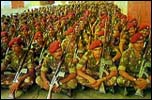The Rediff Special/J N Dixit
'The surrender of arms was a farce'
 The surrender of arms was only symbolic. It was a farce. Only a couple of truckloads of old weapons were brought to the ceremony.
The weapons brought during the following days and weeks were patently
inadequate in number and quantity. I recall some newspaper correspondents
asking General Depinder Singh as to what he would do if the LTTE
did not surrender arms as promised by them and as envisaged in
the Agreement. Depinder Singh's one line response was: "In
that case we would go after them and get the arms."
The surrender of arms was only symbolic. It was a farce. Only a couple of truckloads of old weapons were brought to the ceremony.
The weapons brought during the following days and weeks were patently
inadequate in number and quantity. I recall some newspaper correspondents
asking General Depinder Singh as to what he would do if the LTTE
did not surrender arms as promised by them and as envisaged in
the Agreement. Depinder Singh's one line response was: "In
that case we would go after them and get the arms."
The statement
was interpreted in the Sinhalese press as a clear articulation
of Indian policy that India would function impartially to implement
the letter and spirit of the Agreement. Our Sri Lankan Tamil contacts
were not very happy about this statement of General Depinder Singh.
I told them that what General Singh had stated was legally, politically
and operationally correct and that the implementation of the Agreement
in all its details was for the welfare of the Tamils, and that
his statement should not be misunderstood.
The Sri Lankan government desired some preliminary discussions
with representatives of Tamil groups about the establishment of
the interim provincial government of the north-eastern province
and various aspects of the law and order situation. Prabhakaran
desired these discussions to be held in Jaffna. After some prodding,
he sent a delegation consisting of Yogi, Balasingham and some
other second rung leaders of LTTE to Colombo for these discussions.
They came and stayed at the residence of one of the first secretaries
of the Indian high commission in view of the security concerns
they had.
 The discussions were, however, botched up for two reasons.
First, because of the undulatory approach to discussion specific
issues which the Sri Lankan government representatives adopted.
Secondly, the LTTE representatives were not happy about the logistical
arrangements and the manner in which they were treated by the
concerned Indian official. It was agreed that the Sri Lankan government
would come up with specific suggestions regarding the constitution
of the interim governing council and they should develop some
powers straightway to the proposed interim north-eastern government.
They could then start working on the constitutional amendments
to implement the devolution package.
The discussions were, however, botched up for two reasons.
First, because of the undulatory approach to discussion specific
issues which the Sri Lankan government representatives adopted.
Secondly, the LTTE representatives were not happy about the logistical
arrangements and the manner in which they were treated by the
concerned Indian official. It was agreed that the Sri Lankan government
would come up with specific suggestions regarding the constitution
of the interim governing council and they should develop some
powers straightway to the proposed interim north-eastern government.
They could then start working on the constitutional amendments
to implement the devolution package.
Excerpted from Assignment Colombo, by J N Dixit, Konarak Publishers, 1998, Rs 400, with the publisher's permission.
Readers interested in obtaining a copy of the book may direct their enquiries to Mr K P R Nair, Konarak Publishers, A-149, Main Vikas Marg, New Delhi 110 001.
Tell us what you think of this feature
|



